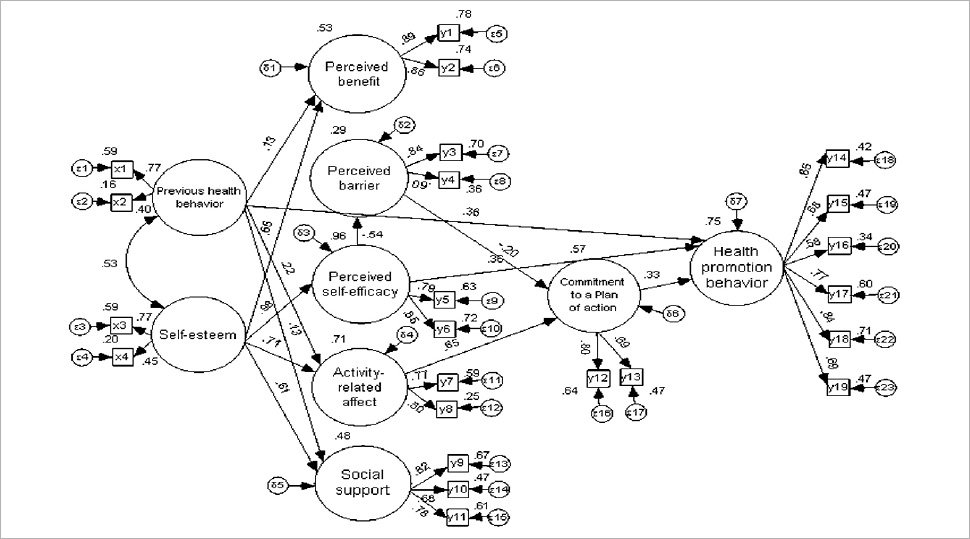J Korean Acad Nurs.
2010 Apr;40(2):264-276. 10.4040/jkan.2010.40.2.264.
A Predictive Model of Health Promotion Behavior in Obese School-Age Children
- Affiliations
-
- 1Gosan Elementary School, Wanju, Korea. ymdje@hanmail.net
- 2College of Nursing, Research Institute of Nursing Science, Chonbuk National University, Jeonju, Korea.
- KMID: 987604
- DOI: http://doi.org/10.4040/jkan.2010.40.2.264
Abstract
- PURPOSE
The purpose of this study was to propose and to test a predictive model that could explain and predict the health promotion behavior of obese school-age children in Korea.
METHODS
Participants for this study were 365 students from 13 elementary schools located in Jeonbuk Province, Korea. The data were analyzed using SPSS 15.0 program and Amos 7.0 program.
RESULTS
The results verified the factors that influence health promotion behavior of the participants. Important direct factors were prior health-related behavior, perceived self-efficacy, and commitment to a plan of action and indirect factors were perceived barrier and activity-related effect. These factors explained 75.3% of variance in the participants' health promotion behavior. The proposed model was concise and extensive in predicting health promotion behavior of the participants.
CONCLUSION
Findings may provide useful assistance in developing effective nursing interventions for maintaining and promoting health promotion behavior in obese school-age children.
Keyword
MeSH Terms
Figure
Cited by 2 articles
-
Elementary school children's perceptions of traditional Korean foods, based on the health belief model
KyoungAe Lee
Korean J Nutr. 2013;46(1):86-97. doi: 10.4163/kjn.2013.46.1.86.Evaluation of items for the food behavior checklist and nutrition quotient score on children in rural areas of Gyeongbuk
Jung-Sun Yoo, Young-Sun Choi
J Nutr Health. 2013;46(5):427-439. doi: 10.4163/jnh.2013.46.5.427.
Reference
-
1. Ahn JM, Park JY. Effect of weight control program on weight, self-esteem, & body-consciousness in obese children. Korea Sports Research. 2004. 15:439–451.2. Ajzen I, Fishbein M. Understanding attitudes and predicting social behaviour. 1980. Englewood Cliffs, NJ: Prentice-Hall.3. Bae BR. Structural equation modeling with Amos 7. 2007. Seoul: Chung Ram Book Publisher.4. Bandura A. Social foundations of thought and action: A social cognitive theory. 1986. Englewood Cliffs, NJ: Prentice-Hall.5. Braet C, Mervielde I, Vandereycken W. Psychological aspects of childhood obesity: A controlled study in a clinicaland nonclinical sample. Journal of Pediatric Psychology. 1997. 22:59–71.6. Cohen S, Hoberman HM. Positive events and social supports as buffers of life change stress. The Journal of Applied Psychology. 1983. 13:99–125.7. Cohen S, Mermelstein R, Kamarck T, Hoberman H. Sarason IG, Sarason BR, editors. Measuring the functional components of social support. Social support: Theory research and application. 1985. The Hague: Martinus Nijhoff;73–94.8. Dietz WH. Overweight in childhood and adolescence. The New England Journal of Medicine. 2004. 350:855–857.9. Jeon BJ. Social psychology. 1974. Seoul: Kyung Moon Publishers.10. Jeong SH. The effects of weight management educational program based problem-based learning (PBL) on self-efficacy, health promotion behavior and obesity index in obese children. 2006. Seoul: Korea University;Unpublished master's thesis.11. Kim MH. A study on the relations of health promoting daily life style and self-efficiency about boys' obesity. 2000. Seoul: Chung-Ang University;Unpublished master's thesis.12. Kim SH. A prediction model of health promotion behavior for school children. 2007. Seoul: Ewha Womans University;Unpublished doctoral dissertation.13. Kim SJ, Yang SO, Jeong GH, Lee SH. Level of health promotion behavior practice in elementary school students. Journal of Korean Academy of Child Health Nursing. 2007. 13:407–415.14. Korean Society for the Study of Obesity. Clinical obesity. 2001. Seoul: Korea Medical Book Publisher.15. Lee JI. A study on obese children's self-efficacy and health promotion behavior. 2001. Gyeongsan: Gyeongsan University;Unpublished doctoral dissertation.16. Lee MJ. Construction of health promotion behaviors model for industrial workers. 2002. Seoul: Chung-Ang University;Unpublished doctoral dissertation.17. Lee SJ, Kim SI, Lee PS, Khim SY, Park ES, Park YJ. Construct a structural model for health promoting behavior of chronic illness. Journal of Korean Academy of Nursing. 2002. 32:62–76.18. Lee YM, Schwarzer R, Jerusalem M. Korean adaptation of the general self-efficacy scale. 1994. Retrieved April 2, 2008. from http://userpage.fu-berlin.de/~health/korean.htm.19. Marlow DR, Redding BA. Textbook of pediatric nursing. 1988. 6th ed. Philadelphia: W. B. Saunders Company.20. Ministry of Health & Welfare. The third Korea national health and nutrition examination survey (KNHANES III), 2005. 2006. Seoul: Author.21. Moon JS. A Study on the development of measuring tool for health belief in adult. 1990. Seoul: Yonsei University;Unpublished doctoral dissertation.22. Moon SB. Basic concepts and applications of structural equation modeling. 2009. Seoul: Hakjisa Publisher.23. Paek YM. Prediction model on health promotion behaviors in male office worker. 2005. Seoul: Ewha Womans University;Unpublished doctoral dissertation.24. Park GS. A study on the relationship between self-efficacy and health promoting lifestyle profile of childhood obesity. 2002. Gwangju: Chosun University;Unpublished master's thesis.25. Park YJ, Kim SI, Lee PS, Kim SY, Lee SJ, Park ES, et al. A structural model for health promoting behaviors in patients with chronic respiratory disease. Journal of Korean Academy of Nursing. 2001. 31:477–491.26. Pender NJ. Health promotion in nursing practice. 1996. 3rd ed. Stamford, CT: Appleton & Lange.27. Rosenberg M. Society and adolescent self-image. 1965. Princeton, NJ: Princeton University Press.28. Schwarzer R, Jerusalem M. Generalized perceived self-efficacy scale. 1993. Retrieved April 2, 2008. from http://web.fu-berlin.de/gesund/skalen/Language_Selection/Turkish/General_Perceived_Self-Efficac/hauptteil_general_perceived_self-efficac.htm.29. School health and youth health promotion. World Health Organization. 2008. Retrieved April 2, 2008. from http://www.who.int/school_youth_health/en/.30. Yun SN, Kim JH. Health-promoting behaviors of the women workers at the manufacturing industry-based on the Pender's health promotion model. Korean Journal of Occupational Health Nursing. 1999. 8:130–140.
- Full Text Links
- Actions
-
Cited
- CITED
-
- Close
- Share
- Similar articles
-
- The Effects of Self-efficacy on Health Promotion Behavior in Obese Elementary School Children
- Structural Equation Model of Health Promotion Behaviors in Late School-aged Children: Based on the Theory of Planned Behavior
- Test of the New Health Promotion Model for the Prediction of Female Employees' Health Promotion Behavior at the Manufacturing Plants
- A Prediction Model for Health Promoting Behavior in Obese Middle-Aged Women
- Factors Related to the Health Behavior of Urban Residents on the Basis of Theory of Reasoned Action



